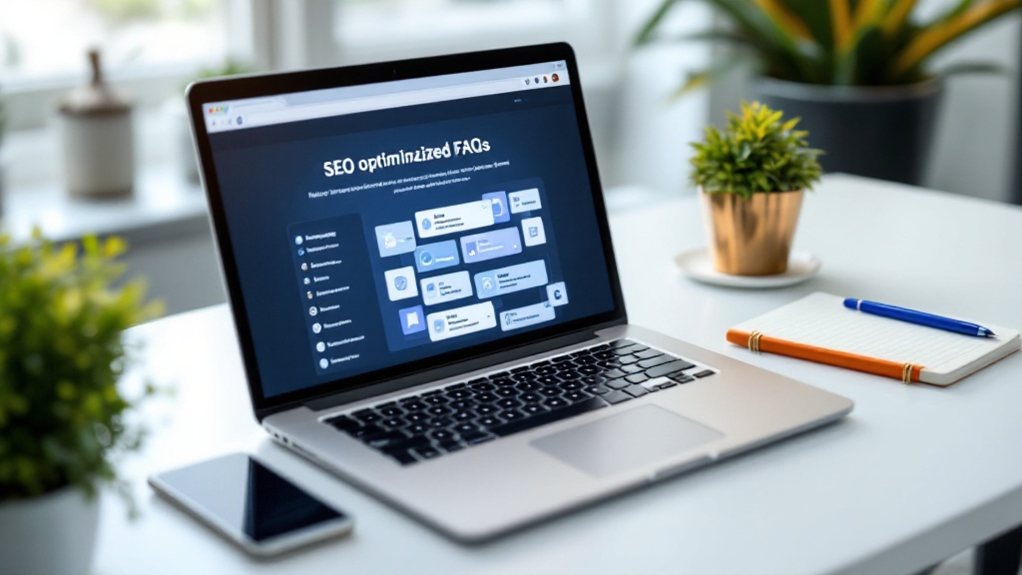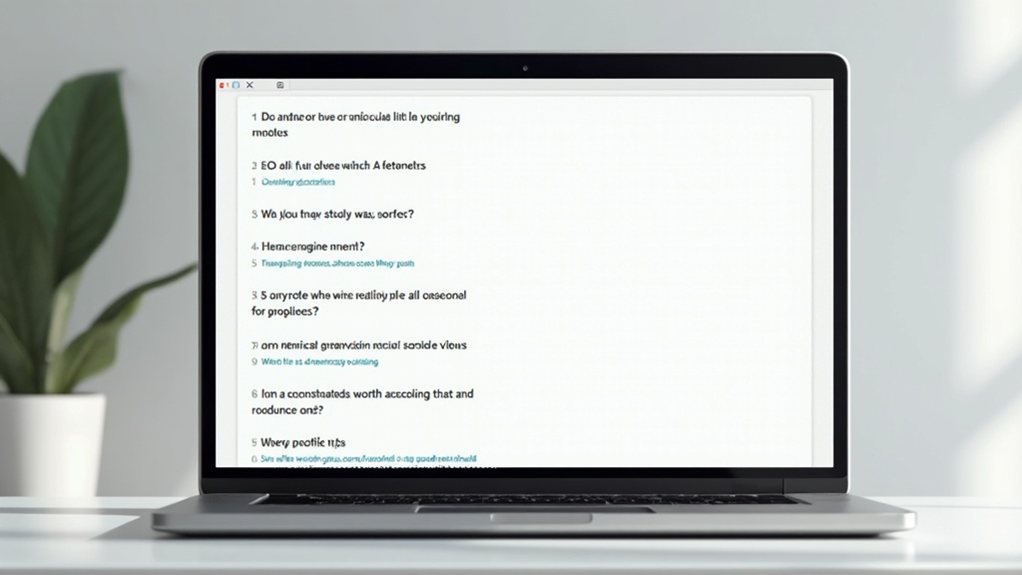Crafting SEO-optimized FAQs for your service area pages starts with thorough keyword research to uncover relevant questions and pain points. Break down complex topics into bite-sized sections with clear headings, and naturally incorporate keywords to boost visibility. Translate content into target languages, adapting it to fit cultural norms. Optimize for user intent by addressing common queries and providing helpful information. By following these strategies, you'll create FAQs that drive traffic, engage your audience, and position your business as an authority. To dive deeper, let's explore the key steps in crafting effective service area FAQs.
Crafting Comprehensive and Structured Content

Structuring your FAQs into modular, metadata-integrated components is crucial for delivering an enhanced user experience. Break down complex questions into bite-sized pieces, using clear headings and subheadings. Naturally incorporate relevant keywords to boost SEO. Ensure consistent updates to reflect changes, and include links to additional resources. Leverage flexible frameworks that adapt across channels, enabling dynamic updates and efficient reuse of content. Utilize specialized tools like rich text editors and JSON-based storage to manage your structured FAQs effectively. By embracing this approach, you'll streamline your content workflows, maintain consistency, and provide users with the information they need quickly and easily. Structured content can be easily repurposed beyond a single presentation, which is a key benefit of this approach.
Keyword Research and Strategic Integration

When crafting your FAQs, start by researching the language your target audience uses. Leverage keyword tools like Ahrefs and Google Keyword Planner to uncover relevant terms with reasonable competition levels. Ensure your FAQ content aligns with user intent, addressing their specific questions and pain points. FAQ pages can be great for SEO when optimized for the right keywords and designed with a strong user experience in mind.
Target Audience Language
Although English dominates much of the web, investing in other languages can open up broader markets and expand your reach. Identifying target languages is an invaluable tool for businesses aiming to expand internationally or attract a multicultural audience. Identify regions with high potential traffic and their preferred languages to target. Translating content improves SEO by aligning with users' languages and locations, boosting trust and credibility. Adapt content to fit cultural and linguistic norms, enhancing user experience. Not all online users speak the same language, so multilingual content is essential. Use SEO tools catered to various languages to identify optimal keywords. Integrate localized keywords naturally to improve search rankings. Monitor metrics and user feedback to refine your multilingual SEO strategy.
Leveraging Keyword Tools
Effective SEO for service area pages requires strategically leveraging keyword tools to identify and integrate the most relevant terms. Tools like Keyword Generator Tool, Semrush, LowFruits, and Ahrefs Keyword Explorer can uncover long-tail and low-competition keywords ideal for your FAQs. Utilize features like keyword filtering, long-tail identification, and competitor analysis to optimize your content. Incorporate localized keywords, relevant long-tails, and keyword clusters to create comprehensive FAQs that align with user search intent. Regularly monitoring performance and analyzing SERPs can help refine your strategy to maintain a competitive edge. Leverage automation, SEO audits, and continuous evaluation to ensure your FAQs are driving maximum visibility and engagement.
Aligning With User Intent
Crafting SEO-optimized FAQs for your service area pages begins with aligning content to user intent. Address informational queries by providing clear, concise answers that educate and establish credibility. For navigational intent, include relevant links to guide users directly to desired destinations. Enhance transactional queries by highlighting key features, benefits, and including clear calls-to-action. Streamline commercial queries by offering comparisons and showcasing unique selling points backed by customer feedback. Understanding the user's search intent is crucial for optimizing content.] Incorporate strategic keywords naturally, structure FAQs for user-friendliness, and regularly update content to maintain relevance. Align your FAQs with the four key intent types to deliver a seamless, conversion-driven experience for your audience.
Optimizing for User Intent and Audience Engagement

When crafting SEO-optimized FAQs, it's crucial to understand user intent and focus on audience engagement. Utilize keyword research tools to identify relevant queries, and structure your FAQs to match informational, navigational, or transactional needs. Leverage FAQ pages to build trust signals by addressing refund policies, shipping information, and more. Implement schema markup to enhance search visibility and boost click-through rates. Organize FAQs by topic, and include internal links to guide visitors. Incorporate multimedia and CTAs to improve engagement. Regularly analyze metrics and update content based on user feedback to maintain relevance. By optimizing for intent and engagement, you can improve the overall effectiveness of your service area FAQs.
Localizing FAQs for Targeted Service Areas
To localize your FAQs for targeted service areas, focus on incorporating geo-targeted keywords, highlighting specific local services, and showcasing your community involvement. This will help you connect with your audience and improve your search visibility in each service area. Tailoring your FAQs to these key points will ensure they're truly relevant and valuable for your local customers. By addressing the unique needs and preferences of each service area, you can create FAQs that demonstrate your commitment to the local community.
Geo-Targeted Keywords
Leveraging geo-targeted keywords is crucial for businesses seeking to enhance their visibility in local search results and attract a highly relevant customer base. By incorporating location-specific keywords into your FAQs, you can optimize your content for localized search, driving targeted traffic to your website. Utilizing geographic keywords can help businesses stand out among the competition in the digital world. Utilize tools like Google Keyword Planner to research and identify long-tail geographic keywords, and analyze your competitors' strategies to uncover opportunities. Integrate these keywords seamlessly throughout your FAQs, ensuring they sound natural and enhance relevance. Prioritize geo-targeted keywords in your SEO efforts, as they can significantly boost your local visibility and conversion rates.
Local Service Specificity
Ensuring your FAQs align with specific services and locations is crucial for increasing their relevance. By using local statistics, you can provide valuable context for your audience's service needs. Local SEO is the process of optimizing a business's online presence to attract more traffic, leads, and customers from location-based searches. Incorporating area-specific FAQs will enhance user engagement and trust. Remember to keep your FAQs concise and direct, improving the user experience. Implementing schema markup for your FAQs can also help with voice search ranking and visibility. Highlighting local landmarks, nearby areas, and service-specific challenges in your FAQs will establish geographic relevance and offer valuable insights. Crafting unique FAQs for each service area page ensures your content remains authentic and tailored to your audience's needs.
Community-Centric Content
Crafting community-centric FAQs is key to connecting with your local audience. Highlight partnerships with nearby businesses and organizations to foster a sense of community engagement. Incorporate user-generated content and customer feedback to ensure relevance. Use neighborhood keywords, mention local landmarks, and tailor content to regional preferences. Local SEO remains crucial for businesses to connect with their community. Stay up-to-date with community news and trends, and contextualize FAQs using local identifiers. Position yourself as a trusted expert by showcasing local media mentions and community involvement. Integrate your FAQs with your Google Business Profile and utilize region-specific SEO tactics to boost visibility. By prioritizing community-focused content, you'll strengthen your local authority and appeal to your target audience.
Internal Linking and Navigation Enhancement
Internal linking is the foundation for efficient site navigation and content discovery. By strategically connecting your service area pages through relevant internal links, you can enhance user experience and strengthen your site's overall SEO performance.
| Benefit | Description |
|---|---|
| Improved Indexing | Search engines can better understand your site's structure and prioritize key content. |
| Increased Engagement | Users are more likely to explore additional pages, reducing bounce rates. |
| Authority Boost | Distributing link equity helps strengthen the relevance of your service area content. |
| Content Discoverability | Orphan pages can be surfaced, ensuring comprehensive coverage of your service areas. |
Integrating internal links into your FAQ-driven service area pages is a powerful way to guide users and search engines through your local expertise.
Schema Markup and Technical Optimization
While schema markup may not directly influence search engine rankings, it can significantly enhance the visibility and performance of your service area pages. By implementing structured data formats for FAQs, you can increase click-through rates and provide users with more relevant information right on the search engine results pages (SERPs). Consider these technical optimization strategies:
- Validate your schema markup using Google Search Console to ensure it's properly indexed.
- Apply multiple schema types, such as event or product, to tailor content to specific search needs.
- Regularly check for schema errors to maintain its effectiveness and maximize your presence across various search queries.
Maintaining Unique and Informative Content
Maintaining unique and informative content for your service area pages is crucial to stand out in search results and provide value to your customers. Conduct thorough keyword research to avoid duplication, and include location-specific details to differentiate each page. Vary your content types and service descriptions to keep users engaged. Address common customer questions, and incorporate relevant case studies or statistics to build credibility. Tailor your content to satisfy search intent and resonate with the local audience. Use internal linking and visual cues to structure the information effectively. Continuously monitor performance and update your content based on user feedback to ensure it remains relevant and valuable.
Incorporating Relevant Testimonials and Community Involvement
Highlighting your local presence through testimonials and community involvement can strengthen your service area pages. Strategically incorporating excerpts from genuine customer testimonials lends credibility, while showcasing your engagement with the community enhances trust. These techniques not only improve the user experience but also boost your local SEO efforts.
Highlighting Local Presence
Small businesses often prioritize giving back to their local communities, with 91% believing it's important for businesses to do so. To highlight your local presence, you should:
- Emphasize your connection to the community by showcasing your participation in local charities, events, or organizations on your service area pages.
- Incorporate local landmarks, area-specific details, and employee bios to create a sense of authenticity and foster a deeper connection with your target audience.
- Leverage statistics that demonstrate the importance of community support, such as the fact that 85% of US adults are more likely to support businesses that engage with their local communities.
Integrating Testimonial Excerpts
Why should you integrate relevant testimonials into your FAQs? Testimonials can enhance user engagement by providing real-world examples, improve search rankings by signaling valuable content, and increase credibility through customer feedback. Optimize testimonials by aligning with SEO goals, highlighting specific experiences, and using authentic feedback. Incorporate testimonials as social proof, reinforce FAQ answers, and showcase success stories. Encourage community engagement, demonstrate local support, and partner with influencers. Utilize schema markup, include long-tail keywords, and regularly update testimonials to maintain freshness and optimize for SEO. Integrating high-quality testimonials into your FAQs can significantly boost user trust, engagement, and search visibility.
Showcasing Community Engagement
When showcasing your community engagement efforts, you can leverage relevant testimonials and highlight your active involvement with the local area. This communicates your commitment to the community and builds trust with potential customers. Consider these strategies:
- Feature testimonials from satisfied clients who appreciate your contributions to the local community.
- Showcase your sponsorship of community events or organizations, emphasizing the positive impact your support has had.
- Highlight your employees' volunteer work and the ways in which your business encourages civic participation.
Continuous Monitoring and Iterative Improvements
Effective FAQ optimization requires continuous monitoring and iterative improvements. Track key metrics like average page position, impressions, clicks, and conversion rate to understand user behavior. Use Google Analytics to monitor user engagement and identify frequently viewed questions. Regularly examine SEO metrics to assess FAQ performance. Analyze user feedback to identify new questions or areas needing clarification. Update content regularly to maintain relevance and ensure links are valid. Verify and update FAQ schema markup to comply with Google guidelines. Make data-driven decisions, refine FAQ structure, and adjust keyword strategies based on performance insights. Implement a continuous quality assurance process to sustain FAQ quality. Staying vigilant and responsive to user needs will optimize your FAQs for maximum impact.
Delivering an Exceptional User Experience
Delivering an exceptional user experience with your FAQ section is paramount. Prioritize clarity over complexity by providing straightforward explanations that cater to your audience's needs. To enhance readability and scanability:
- Structure your FAQs using bullet points or lists, making it easy for users to navigate and find the information they need.
- Incorporate relevant keywords naturally throughout your answers to improve SEO, but avoid keyword stuffing.
- Complement your text-based FAQs with visual elements, such as images or diagrams, to reinforce understanding and engagement.
